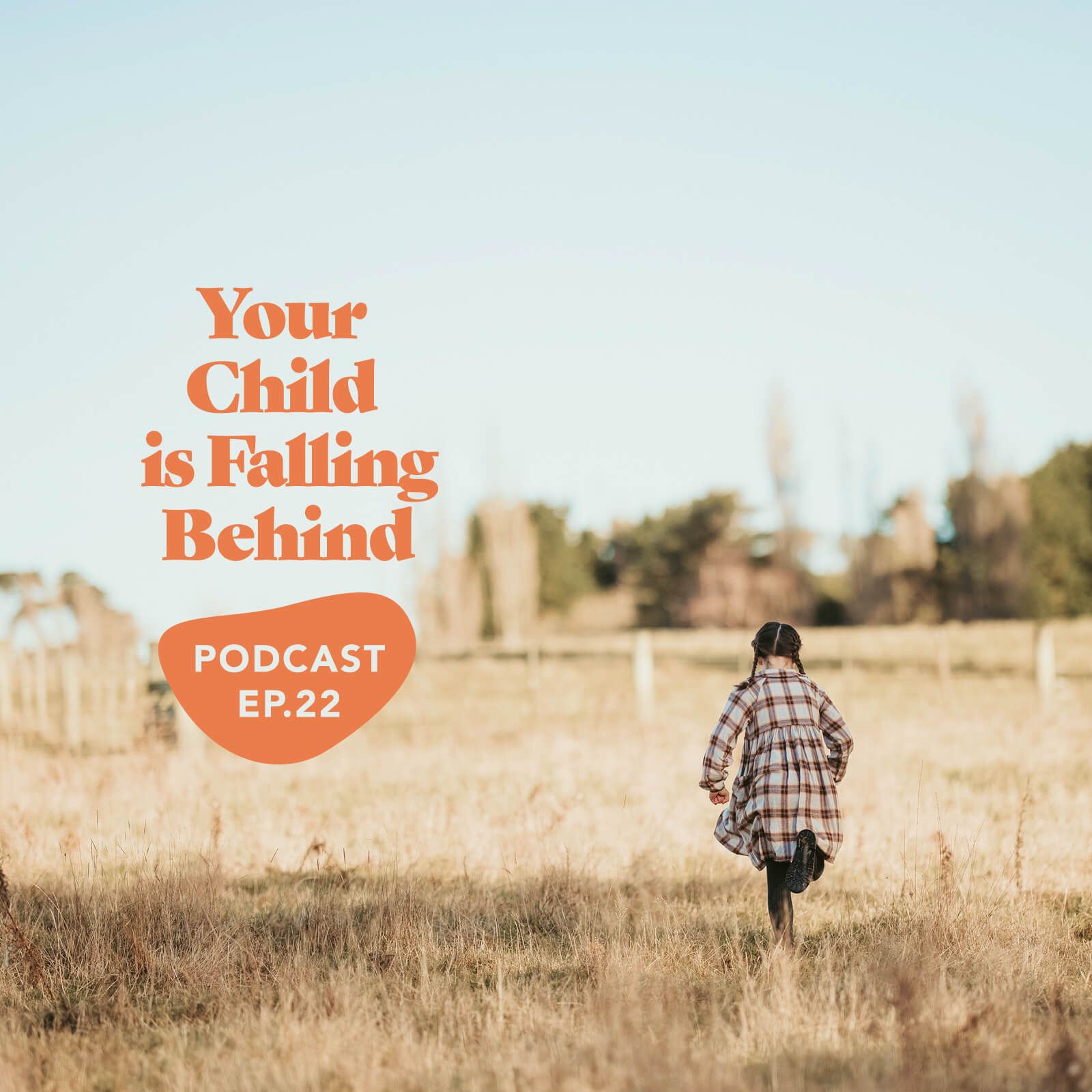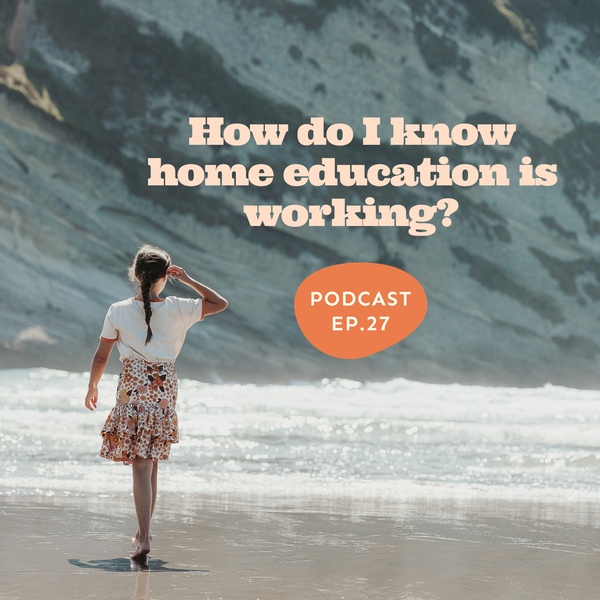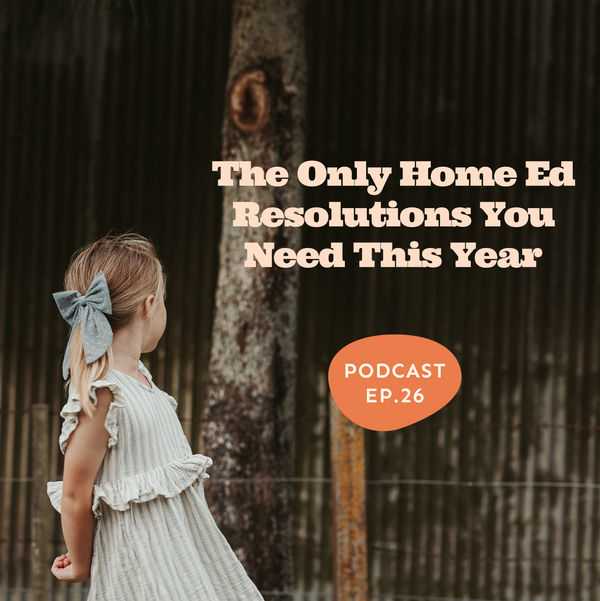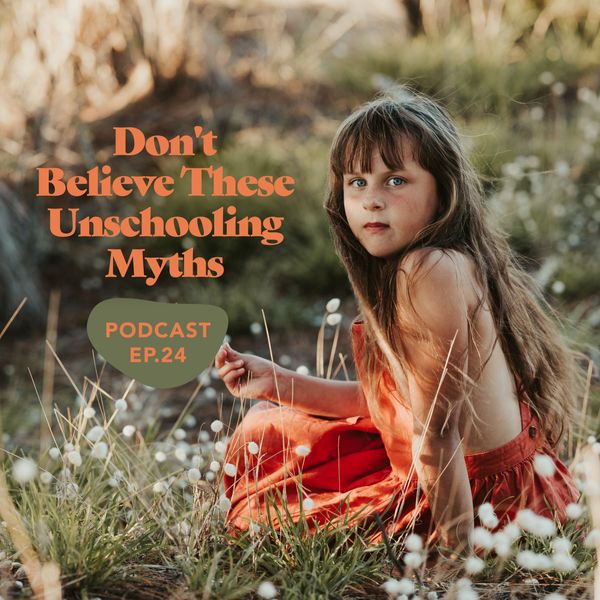In this episode I’m talking more about something this podcast was literally born from: the idea of children falling behind where they should be.
First, I talk about how the world generally views progress in childhood, and why it’s so problematic and broken. And then second, I present a different view of that. A different idea of measurement and benchmarking and progress for our children.
Wherever you are in your journey right now, I hope this way of looking at things brings you and your children some comfort, some reassurance, and some confidence.
These private episodes go even deeper, backed by research, the science of how children learn and grow, and more than a decade of lived home educating experience. Each one is designed to help you rethink, reframe, and recalibrate the way you're walking this path, giving you the confidence to live the version of life you want. The Collection is 23 episodes strong and counting, with over 10 hours of listening available right now.
As a subscriber, you'll also get immediate access to my self-paced course, expert-led masterclasses recordings, five downloadable guides, our school exemption documents, and more 💛
Complete Transcript
Helloooo and welcome to the Life Without School podcast, here to help you and your children live the life you want to, not just the one you’re told you should.
I’m Issy, a writer and home educating dad from New Zealand.
You can find my work at starkravingdadblog.com – all of my posts, podcast episodes, and short films created to encourage, support and reassure anyone walking this road less travelled.
Thank you so much for tuning in to listen today. Alright, let’s get into this week’s episode.
/INTRO
Right – let’s get into this episode, because today I want talk more about something that this podcast was literally born from.
It’s this idea of progress in childhood. Of children falling behind where they should be.
I presented a version of this to Julie Bogart’s Brave Learner community recently, and I found the experience of surfacing up all of this to talk about it again almost cathartic. And enough people in that session seemed to feel the same for me to realise I need to have this conversation here, too.
So – thanks again to you, if you’re listening, Julie, because it was a real thrill to sit down with you, and your team, and your people.
I need to start by taking you back through a bit of the history of one of our son’s experiences at school, many years ago, to set the scene on why I’m talking about this again – and why I believe the things that fall out of this conversation are just so incredibly important. For you as a parent, and helping you manage and balance the educational responsibility you’re carrying, yes…but also for our children. Because there are few things in life that impact children more than relentless high expectations and the pressure to achieve and progress.
So with that importance in mind, let’s talk this through.
MUSIC
You might have heard some of the background story I’m about to tell, but this conversation needs it told again, so come with me while I take you back to 2017. Five years ago. Our two eldest children were in school at the time, and William – who was 7 – was struggling. Really struggling.
He was behind on almost every measure the school used to benchmark children his age. And after a few of those failures had started stringing together, his teacher invited us in for a chat, to explain how concerned she was for him. And, for his future. His reading level was well behind where it should have been, he seemed to have almost no mathematical comprehension at all, and he could barely form a single letter on paper. Other children his age were completing their early reader books, they understood them, they were doing their maths worksheets and getting them mostly right, and they were starting to write little stories. For William, his teacher told us, something had to be done.
Something had to change.
I vividly remember sitting in that classroom – Kate and I were perched on those miniature chairs they have for kids, looking up at this teacher behind her desk on her adult sized chair – and as we went through that experience in and around that time, and all of the stresses and pressures that came with it for William – it was like a series of gears that had already started turning in my brain suddenly just clicked into place. And, I very clearly saw the problem.
It just wasn’t the same one the teacher saw.
The problem – as I saw it – was that we had defined a series of measures that were totally external to all of these children – and I remember while I was sitting there with the teacher, looking around at all of those little chairs, and picturing all the different children, just in that one classroom – and we were asking every one of them to conform to the very same measures. To achieve well against them. Regardless of who they are, how they like to interact with the world, what their strengths might be, and where their own personal life arc was currently at.
And so we thanked William’s teacher for her time, wrote to the school saying that he would not be returning, and set out to define – with his help – a new set of measures for him. And his older brother, who also left school at that time, and these days, his two younger sisters as well.
So, this idea of measuring, and benchmarking, and progressing in life, and the big mix of things that comes with it all…was literally the catalyst for choosing a different path through life for us – one that has taken us on a very different life journey.
And, if you’ve ever read it, you’ll know that also ended up being the catalyst for the first post I ever wrote on this topic.
So with that short bit of history told, with the scene set, I want to do two things:
First, I’ll talk about how the world generally views progress in childhood, and why it’s so problematic and broken. And then second, I’ll present a different view of that. A different idea of measurement and benchmarking and progress for our children.
Let’s do it.
MUSIC
Ok, so let’s spend some time talking about the way we generally view progress in childhood, and why I believe it’s so problematic and broken. And then, like I said, I’ll talk about some different ways we can start looking at all this, and why those different perspectives can make such a big impact on how our children see themselves in the world.
I won’t try and give you a history lesson here on when and why we as a society started obsessing over testing, and measuring, and benchmarking children formally, because all that stuff is mostly another topic for another day. And, honestly, we’d be here too long. What matters, for this conversation, is that because this concept of progress has become so ingrained in our culture over the past 100 or so years we now all believe, as parents, that it’s important. It has less hold over some of us than others, but generally…most parents, including myself, feel the pressure – to some degree – of keeping their children moving forward.
Most parents believe, by default, that it’s important to know where their children are at – particularly in an academic sense. And this so often spills over into our home educating approach. Because…that’s how it’s done, by everyone, everywhere.
And so I want to take that – that feeling, that pressure, that deeply ingrained social expectation – and boil it down into a single statement that’s clear and examinable. That statement is this:
It is bad for a child to fall behind.
We need to examine this firmly.
Because that’s the lens we as parents are asked to view childhood through, right?
It’s bad for a child to fall behind. It’s…almost a foundational life premise, especially as children start getting a bit older.
And so if we decide to choose to live a life without school, then of course we feel that it’s up to us – as home educators – to make sure they don’t.
In the eyes of the world, that’s our primary responsibility as homeschoolers. Do not let your child fall behind where they should be for their age. It’s perceived as the most important thing.
But this starting premise comes with some conditions that we need to be sure we actually believe in, and are comfortable with.
If we accept this state of play for childhood. If we accept that it is in fact bad for a child to fall behind…then we are also accepting that there is a clearly defined and extremely important end goal. One that needs to be achieved within a specific timeframe. It means we’re acknowledging that we know what this goal stands for, what it will result in, how important it is for our children to achieve it, and how they will need to go about working towards it between the ages of roughly 5 and 18.
We must accept all those things – they come bundled, by default, with the idea of a child falling behind.
Now, I want to ask you a series of questions. Not to answer out loud, but just quietly – in your own mind – let them sink in and reflect. Right now, as I talk through them, but later as well. Because you’ll probably find the more you really think about these questions – or at least, some of them – the more challenging you’ll find them…even if you don’t fully buy into the idea of measuring your child and making sure they keep up with the pace. And because these questions are challenging, you’ll find that as you go through the process of examining them, and questioning, and reflecting on them…you’ll free yourself even more from any hold they have over you.
So let me ask these out loud now, and I encourage you to come back to them later, on your own:
Have you ever really stopped to acknowledge and process – and, based on that, actively chosen to accept – that it is categorically bad for a child to fall behind? Have you asked yourself why it’s bad, and looked into what might actually happen if they do?
Do you personally understand, at a deep enough level to justify the pressure you’ll need to apply to both yourself and your child to achieve it, where the concept of pushing children along came from?
Are you super clear on who decided the most important subjects, topics, schedules and delivery cadence for every age bracket along the way? Are you clear on who decided what the end result of hitting the goal would be, what success will look like, and what it will all lead to?
And, are you across the global results of all of that? Are you confident the end goal we’re asking our children to submit their formative years to is substantially contributing to their ability to experience life to the fullest? To help them find meaning, and purpose, and satisfaction? To build them up, and prepare them for an adult life in which they’ll thrive?
And even below all of that more aspirational stuff, are you absolutely sure – do you know for a fact – that it’s doing the basics like steering literacy and numeracy in the right direction from before we put this expectation…this pressure not to fall behind…in place?
These are the questions we need to ask ourselves. Objectively. And this time of year, when a lot of that bubbles to the surface more than ever, is the best time to ask them.
I’ll leave you to mull on those questions separately, because the process you’ll go through when you really start asking yourself these things is super enlightening. Empowering, actually. So I highly encourage you to spend some time with them.
For now, I want to share one of my own reflections that came from thinking about all this. And if you’ve ever read any of my posts or listened to a few episodes of this podcast, this will be a very familiar story. But it needs to be told again here, because it strikes right at the heart of everything wrong with applying external measures to children.
My two eldest – Joseph and William – could not be more different. They’re both boys, they’re both a similar age – there’s only a two year gap there – and they’re both from the same family. They have the same parents, the same siblings, the same dog. They’ve grown up in the same environment. But that’s where their similarities end.
Joseph is what you would describe as… classically academic. He inhales books. He writes beautifully and seems to just have this appetite for creating his own work. He likes to please, and is quite happy sitting at a table for long periods if that’s what’s been asked of him. If you tell him it’s important to complete an assignment or project, or to pass a test, he will do what he needs to. He makes progress. The right kind of progress. He hits the right benchmarks. He meets the right measures.
But his brother William – who we talked about earlier – does not.
William can read, but only really calls on the ability when he needs it for something. A recipe, or a set of instructions, that kind of stuff. He does sometimes read books for enjoyment, but in fits and starts rather than consistently. And the books he enjoys would be considered ‘below his grade level’. If the material doesn’t interest him, it will not be consumed. For any reason.
He’s not a fan of writing, and it’s just because he doesn’t enjoy the physical process of sitting there to do it. He’s told me that. He has a vivid imagination and loves telling stories, but when it comes to putting them down on paper…he finds it a bit laborious.
He is physically electric. He needs to move to be happy. He learns by doing, tinkering, exploring, testing, breaking, fixing…making noise.
If you were to measure these two children against normal academic standards, Joseph would crush his younger brother. He’d write you a beautifully constructed story, illustrate it, and then produce the stack of novels he’d consumed that week for inspiration.
But if you needed something taken apart and fixed, some fresh baking and a healthy smoothie, a beautiful piece of music played on a piano, or even a totally unique and creative perspective on a problem you can’t get your head around…you’d turn to William. He would be your guy.
So let’s go back to our starting premise – that it is bad for a child to fall behind, and that we have a set definition of what that means for every child. Almost globally.
How is it going to go when we try and measure the progress of these two boys?
Well, we’re going to be able to tell one of them that their approach to learning, and life, is correct, and acceptable. And we’re going to have to tell the other boy that his is not.
If we distill it all down, we’re going to have to tell William that he needs to change.
When you really stop to think about that…the idea of an individual child as a square peg trying to fit into a round hole that we’ve told them is non-negotiable, the very idea of an external measure – one that’s the same for everyone – becomes almost horrifying.
Before we move on, let’s look at this external benchmarking thing from one more angle. Again, this is something I’ve shared before, but is very tied to what we’re talking about here:
Picture a running race. A really, really long running race. One that takes about a decade longer to finish than a marathon. It’s long. As you’re lining up – which, you had no say in by the way – you’re told where the finish line is, how long you have to get there, what your split times need to be, and how and when you’ll be told that you’re either on track or behind. The course is set – you have to take the path that has been decided on for you, and you can’t veer from it. Everything about the race – the length of it, and all the benchmarking along the way, is the same for everyone – regardless of your fitness levels, or even your interest in this kind of thing.
You’re told to start, and then you’re told never to slow down. Because you need to complete the race in time before you can fully live life. Before you can access the people, and places, and opportunities that will bring you important things like the chance to make a liveable income.
If you don’t complete the race, in the time and in the way you should, you will not have those same opportunities.
Now, if you got to the end of that race, and you discovered that statement was absolutely true…then gosh, regardless of how difficult you found it you’d be thankful for the experience. You’d be thankful to have been pushed and pushed and pushed to get there. You’d be thankful you didn’t question it, and fight it, and try and leave the race for a different path.
But if you got to the end of that race – that decade-long race – only to discover that the statement wasn’t actually true…that you didn’t need to complete it to live a full, complete version of your life…how would you feel?
Because that’s the reality for a child who doesn’t fit the measures and style of progress we typically ask of them. They’re just not at all suited to how the race works. They do their best, but every step of the way is a struggle. Then, they finally get there, only to discover that they didn’t even need to go through all those years of being told they’re too slow, too far behind.
But by then, it’s almost too late. Their most important, formative years have been spent being told they’re just not fast enough, or good enough.
And for what? This obsession over progress? Of keeping up? Of…not falling behind?
MUSIC
Right. With the pitfalls of this idea of measurement and progress on the table – what do we do? Do we throw the concept out the window completely? Is that how we liberate ourselves and our children from this big bundle of pressure?
Well, not so fast.
Because building a muscle of measurement in life is actually really useful. We all have hopes, and dreams, and skills, and talents, and things we love, and things we want to explore more.
We all have things that make us feel calm, happy, empowered, motivated, driven, or satisfied…but when we don’t regularly tune into what those things are…when we don’t actually define them, and continually redefine them as we grow…we’re far less likely to consistently achieve them.
It’s like being asked to shoot a basketball through a hoop – but you can’t see the hoop. So you’re just throwing and hoping. Maybe you’ll get lucky. Maybe every now and then the ball will go in the hoop, and the scoreboard will light up. But chances are, you’ll miss, and you’ll miss, and the whole experience will just be frustrating.
Life without conscious, thoughtful, intentional measures and goals can feel like that. A bit frustrating, a bit directionless.
So how do we reconcile this with what we talked about earlier. How do we define measures for our children – and ourselves – that don’t require us to change, or to squeeze into a hole we can’t fit in?
Well – we stop accepting almost all measures and benchmarks that are external to us, measures that are defined by someone else, and instead start looking for the ones that are already within us.
Now, I know that probably sounds a bit nebulous. A bit…airy fairy. So before I go any further, I want to share a story – and some research – that’s related to this internal vs external stuff.
You may have heard the research I’m about to share here, because it’s been around a long time now, but it’s also been largely ignored in education, so there’s actually a good chance you’ve never heard about it. It’s also worth saying that this research wasn’t related to education, specifically…that wasn’t its purpose. It was related to drive, and motivation in humans. Which, in my opinion, is a much more interesting place to work from. Because it has a kind of objectivity.
Let me take you through it – in the 1980s, three researchers set up a scenario where they watched a classroom of preschoolers for several days, and identified the children who consistently chose to spend their open play time drawing. So we have a bunch of kids playing during their free time, and a number of them who would always choose to draw. The researchers designed an experiment to test the effect of rewarding that drawing activity – one that these children clearly already enjoyed.
They divided the children into three groups – an ‘expected reward’ group, an ‘unexpected reward’ group, and a ‘no reward’ group.
For the first group, they showed the children a certificate, one that had a nice ribbon and their name on it. And then they offered the certificate to the child, but only if they produced a drawing during their free time.
For the second group, the researchers just asked the children if they wanted to draw, and said no more. If they did go ahead and sit down and do some drawings, the researchers surprised them with one of those fancy certificates.
And for the third group, there was no promise of a certificate for drawing, and no surprise of one if they did. No certificate in the picture at all.
All three groups, of course, sat down to draw that day. No problem. It was something they all liked to do, would have done anyway, and for a few of them there was now even more incentive to. At the end of the session the first group received the certificate they’d been shown earlier and were expecting, the second group were pleasantly surprised by it, and the third group…well, it was just a normal day.
The researchers left, waited a whole two weeks – which might as well be months, in child terms – and then came back to secretly observe another free play session on another day. The teachers set the environment up just like they always did, every day, making sure they put out blank paper and pens for drawing, among other things.
What those researchers observed that day is actually quite incredible. The children who were part of the second and third groups from the original experiment – the ones who were either surprised with a certificate, or not given one at all – got straight into a creative drawing session just like they always did. Because, that’s what they enjoy. But the children who were in the group who had been shown a certificate, and given it only when they completed their drawing, had quite clearly lost some of their motivation and interest for an activity they’d always enjoyed. Not all of them sat down to draw any more, and those from that group that actually did didn’t spend as long there as they used to.
Through bringing in an external element, we turned their internally motivated play into something that felt like work. Into something that someone else suddenly had their hand in. Even two weeks after the researchers had spent their morning in that classroom.
Now, to be clear, it wasn’t the reward itself that was the problem – we can see that with the unexpected surprise group keeping the same motivation levels right through.
The problem happened when we made an external reward, and external carrot, contingent on a child doing something. And yes, a grade or a mark on a test or an assignment or a piece of work is absolutely the same thing.
Those researchers replicated this experiment in all sorts of other conditions, with adults as well as children, and continually got the same kinds of results. Adding conditional, external rewards or motivators eroded internal drive and motivation.
That was the late 1970s and early 80s, right. And the results were so controversial – because they fundamentally undermined how we approach education, which is allll about external measures – that they were pretty much ignored. And then 20 years later, in the late 90s, more researchers picked all that work back up and reanalysed it to confirm it all. They went back over 128 of these kinds of experiments, from these kinds of research areas, and concluded that…
Yep, they still hold up. Yep, they are still a thing. When you focus on an external reward for a short term goal – like the incentive of a good grade on a test or project or assignment – you mess with the internal motivation for doing that thing. Often, for a long time.
This was one of the researcher’s closing statements:
“Careful consideration of reward effects reported in 128 experiments lead to the conclusion that rewards tend to have a substantially negative effect on intrinsic motivation. When institutions – which include families and schools, and they specify that – focus on the short-term and opt for controlling people’s behaviour they do considerable long-term damage.”
So – what does that tell us? It tells us that the idea of leaning on motivators that are already within us is not airy-fairy at all.
It tells us, very clearly, that if we’re going to apply external measures and standards to a child that they played no part in defining, and use them as an incentive to have them perform tasks, or assignments, or tests, or really almost anything – and yes, this applies as much to school work as it does to taking out the trash each week – we’re going to have a problem.
This kind of research now, by the way, holds some of the most robust findings in social science. It is as watertight as research can get. And, like I said earlier, largely ignored. The idea of using external incentives and measures like grades as a controlling measure for moving children along a path is…too deeply ingrained.
But you, as a home educating parent, can tune into this research. And leverage it in your family life.
So now we can go back to that statement I made that sounded a little bit nebulous, and look at it again:
What would it look like to stop accepting and using measures and benchmarks that are external to us, measures that are defined by someone else, and start looking for the ones that are growing within?
And going back to our starting premise earlier, of it being bad for a child to fall behind…what would it look like if our starting premise, and foundation for our family life, was that the concept of failing behind doesn’t even exist.
So let’s reframe our target.
Let’s shift from a child trying to achieve a grade or measure, or even from trying to teach a child, or have them learn, and instead tie measures and goals to their own personal growth.
To their journey through life. To…their own personal story.
But, how do we identify that? How do we surface it, so that it can become a target, and something we can use to measure our own version of progress?
Well, just like a muscle or set of muscles we focus on developing, it’s something we’re inherently aware of. It’s…within us. And the more we tune into that, the more our awareness of it grows. We feel it through things like happiness, and satisfaction, and meaning, and purpose, and service. And when we stray from living life in a way that grows those areas within us, we feel it. We feel those good things decline, or go missing. We don’t really need anyone to tell us where we’re at.
So our job – as parents, or teachers, or guides, or mentors, or coaches – however you see yourself in your role as a home educator – is to help your child build on their inherent ability to feel where they’re at. To be aware of their growth in life, and whether that’s tracking in a direction, and in ways, that they want it to.
And that starts with communication. It starts with a conversation. It starts with them. Which, of course, is the reverse of a typical child progress measurement that’s entirely separate to them, and put on them.
To show you what I mean, I again want to go back to William’s story from earlier. Because what we heard there – with his struggles, and disappointments, and frustrations, and…falling behind…was just the first chapter of his life story. Since then, with our help, he’s written more of it.
When he was eight, we sat down with him and started a conversation about the things that might be important to him. And we explained that it would be those things that we’d start bringing into focus. That it would be those things he could start to measure his own progress against. And that as he learned more about himself, those things could change, and evolve, and develop however he liked.
In short: we helped him start turning his concept of progress from looking out at what was expected of him, to looking in at who he wanted to become.
And through those conversations with us, and encouragement and guidance, he started focusing more on what felt interesting. For him, that very quickly became a mix of creative and practical things. He started baking, and playing around with musical instruments, and taking coding tutorials. He got into the garden, and tinkered with bikes, and motors and electronics. He built lego, and turned his creations into stop motion films. He took the flips he was doing on the trampoline to ledges around the house, and into playgrounds.
He started making progress in life. Not progress someone else expected of him. Not progress that would typically be seen as important. But progress that actually meant something to him.
William is now 12, almost 13. He has grown from being a frustrated, defeated, judged child into a confident young man. He is already what I would call an accomplished pianist. He is a baker, and a gardener. He is a coder, a gymnast, and a martial artist.
So what’s made the difference, between the William who was stressed and frustrated, and the William who is thriving as he goes into his teenage years?
Well, the difference between life measures that were external to him, and a sense of progress that now comes from within.
And he is so much more, already, than the world of external expectations was ever going to let him become.
As a society – as a global culture – we have become obsessed with the idea of academic progress. We tell children what is expected of them, by what age, and how they’ll need to go about proving it. It does not matter if the child naturally resonates with those expectations.
Throughout that journey, the child will move progressively towards finding some kind of proficiency in what has been asked of them.
And they will move progressively away from a desire, and from the opportunity, to explore what makes them unique.
In the end, they will set aside the hopes and dreams that used to bubble inside them, and become pretty much who they’ve been asked to become. And it may not be until much later in life that those hopes and dreams start swimming back to the surface again, asking to be heard.
Maybe it’s your summer break right now, and you’re reflecting on the year that’s been and starting to think about the one to come.
Maybe you’re right in the middle of it, looking behind you, trying to reassure yourself that you and your children have come somewhere.
Wherever you are in your journey right now, I want to remind you of a very different, but very possible, starting premise for your child and their education:
That the true essence of childhood is not learning. It is becoming.
Thank you so much for being here today, and listening to what I believe is one of the most important mindset adjustments we can make as a parent. I hope you’ve found some food for thought here. No, more than that – I hope you’ve found some comfort, and some reassurance, and some peace…
Thanks for listening in, and I’ll see you back here soon.
Bye for now.








